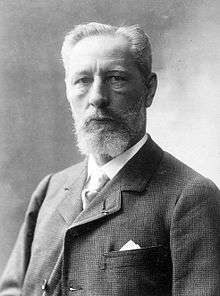Eugène-Melchior de Vogüé
| Eugène-Melchior de Vogüé | |
|---|---|
 Eugene-Melchior de Vogüé, photo by Nadar. | |
| Born |
Marie-Eugène-Melchior de Vogüé 25 February 1848 Nice, France |
| Died |
29 March 1910 (aged 62) Paris, France |
| Occupation | Diplomat, archaeologist, philanthropist and literary critic |
| Notable works | The Russian Novel (1886) |
Marie-Eugène-Melchior, vicomte de Vogüé (25 February 1848 – 29 March 1910) was a French diplomat, Orientalist, travel writer, archaeologist, philanthropist and literary critic.
Biography
Born in Nice, France, he served in the Franco-Prussian War, and at the conclusion of the war entered the diplomatic service of the Third Republic, being appointed successively attaché to the legations in the Ottoman Empire and Egypt, then secretary to the embassy in Saint Petersburg.[1] He resigned in 1882,[2] and from 1893 to 1898 served as representative of Ardèche to the French National Assembly.[3]
His connection with the Revue des deux mondes began in 1873 with his Voyage en Syrie et en Palestine, and subsequently he was a frequent contributor. He did much to awaken French interest in the intellectual life of other countries, especially of Russia, his sympathy with which was strengthened by his marriage in 1878 with a Russian lady, the sister of General Michael Nicolaivitch Annenkoff; De Vogüé was practically the first to draw French attention to Fyodor Dostoyevsky. Many consider de Vogüé's essay to be the first major examination of the novelist's work.[4]
Eugène-Melchior was also a brother-in-law of Karl de Struve, Russian Ambassador to Japan, the United States, and the Netherlands.
He became a member of the Académie française in 1888. His uncle, Melchior de Vogüé, also served in the academy concurrently for a few years.
In 1897, he wrote a short series of books concerning the War of the Spanish Succession.
Works
- (1876). Syrie, Palestine, Mont Athos (1887 edition).
- (1877). Vangheli.
- (1879). Boulacq et Saqquarah.
- (1879). Chez les Pharaons.
- (1879). Histoires Orientales.
- (1883). Les Portraits du Siècle.
- (1884). Le Fils de Pierre le Grand.
- (1884). Mazeppa.
- (1884). Un Changement de Règne.
- (1885). Histoires d’Hiver.
- (1886). Le Roman Russe.
- (1887). Souvenirs et Visions.
- (1888). Le Portrait du Louvre.
- (1889). Remarques sur l’Exposition du Centenaire.
- (1890). Le Manteau de Joseph Olenine.
- (1891). Spectacles Contemporains.
- (1892). Regards Historiques et Littéraires.[5]
- (1892). Heures d’Histoire.
- (1893). Cœurs Russes.
- (1893). Notes sur le Bas-Vivarais.
- (1896). Devant le Siècle.
- (1897). Jean d’Agrève.
- (1898). Histoire et Poésie.
- (1899). Les Morts qui Parlent (Scènes de la Vie Parlementaire).
- (1900). Le Rappel des Ombres.
- (1902). Pages d’Histoire.
- (1903). Le Maître de la Mer.
- (1904). Sous l’Horizon: Hommes et Choses d’Hier.
- (1905). Maxime Gorki.
- (1910). Les Routes.
Selected articles
- (1894). "Un Regard en Arrière — Les Terroristes Russes," Revue des Deux Mondes, Vol. 122.
- (1894). "Le Dernier Livre de Taine," Revue des Deux Mondes, Vol. 122.
- (1894). "À Propos d’un Débat Religieux," Revue des Deux Mondes, Vol. 123.
- (1894). "La Civilisation et les Grands Fleuves Historiques," Revue des Deux Mondes, Vol. 125.
- (1895). "Jean-Jacques Rousseau et le Cosmopolitisme Littéraire," Revue des Deux Mondes, Vol. 130.
Posthumous
- (1911). Sous les Lauriers; Éloges Académiques.
- (1932). Journal du Vicomte Eugène-Melchior de Vogüé: Paris, Saint-Pétersbourg 1877-1883.
Translated into English
- (1889). "Social Life in Russia," Part II, The Harper's Monthly.
- (1887). The Russian Novelists.
- (1916). The Russian Novel.
- (1890). "Through the Caucasus," The Harper's Monthly.
- (1891). The Tsar and his People: or, Social Life in Russia.
- "Social Life in Russia," pp. 1–98.
- "Through the Caucasus," pp. 101–147.
- (1892). "The Neo-Christian Movement in France," The Harper's Monthly.
- (1895). Russian Portraits.
- (1897). "Leo XIII," The Forum.
- (1904). The Master of the Sea.
References
- ↑ Gosse, Edmund (1913). "Eugène Melchior de Vogué." In: Portraits and Sketches. London: William Heinemann, p. 250.
- ↑ Gosse (1913), p. 254.
- ↑ Gosse (1913), p. 264.
- ↑ Röhl, Magnus (1976). Le Roman Russe de Eugène Melchior de Vogüé. Stockholm: Almqvist & Wiksell.
- ↑ Biré, Edmond (1890). "Un Académicien d'Aujourd'hui: Le Vicomte Melchior de Vogué." In: Histoire et Littérature. Lyon: Librairie Générale Catholique et Classique, pp. 341–357.
-
 This article incorporates text from a publication now in the public domain: Herbermann, Charles, ed. (1913). "Eugène-Melchior, Vicomte de Vogüé". Catholic Encyclopedia. New York: Robert Appleton.
This article incorporates text from a publication now in the public domain: Herbermann, Charles, ed. (1913). "Eugène-Melchior, Vicomte de Vogüé". Catholic Encyclopedia. New York: Robert Appleton.
Further reading
- Blaze de Bury, Yetta (1898). "Eugène-Melchior de Vogüé." In: French Literature of Today. Boston and New York: Houghton, Mifflin & Company, pp. 133–155.
- Rod, Édouard (1892). "Le Vicomte E.M. de Vogüé." In: Les Idées Morales du Temps Présent. Paris: Perrin, pp. 263–289.
- Seillière, Ernest (1938). "Eugène Melchior de Vogüe et les Problèmes Sociaux du Temps Présent." In: Le Naturalisme de Montaigne et Autres Essais. Paris: Éditions de la Nouvelle Revue Critique, pp. 135–182.
External links
| Wikiquote has quotations related to: Eugène-Melchior de Vogüé |
| Wikimedia Commons has media related to Eugène-Melchior de Vogüé. |
- Works by Eugène-Melchior de Vogüé, at Hathi Trust
- Academie Francaise Biography
- "Dostoyevsky and the Religion of Suffering", from Le Roman Russe.